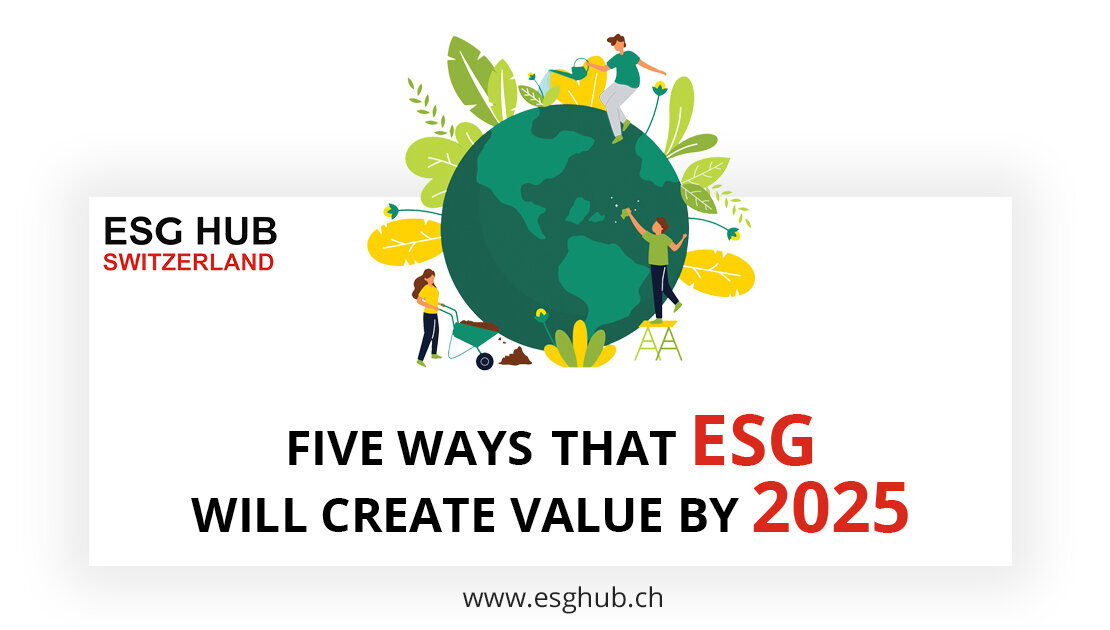Five ways that ESG will create value by 2025

“ESG is an all-encompassing term for a sustainable value creation strategy that takes environmental, social, and governance issues into account.”
ESG, which stands for environmental, social, and governance, is not a new concept. However, over recent years, investing in ESG has taken off and is getting worldwide attention.
ESG investments have seen phenomenal growth. Recent Bloomberg reports projects that global ESG assets will exceed US $53 trillion by 2025, accounting for more than one-third of the projected total assets under management by then. This momentum has pushed every investor, fund manager, and investment service to consider the importance of ESG.
Nowadays, when investors put money into a business, they want their investment to contribute not only to profits but also to sustainable development.
Investors’ growing interest in ESG factors reflects their belief that environmental, social, and corporate governance issues, including risks and opportunities, can affect a company’s long-term performance. Furthermore, properly considering sustainable development and ESG will undoubtedly benefit the company while also creating value for the society and environment.
Here are the five ways by which ESG will create value by 2025.
But first, let’s talk about,
What are ESG and ESG investing?
“ESG” is an acronym for “Environment, Social, and Governance.” It is a three-part company criterion used by global investors to evaluate companies and investments:
Environment refers to the environmental performance of the company. What steps, for example, is your company taking to reduce its carbon footprint? GHG emissions, air and water pollution, deforestation, renewable energy, and other factors are included in this.
Social addresses the social aspects of your company. How does your company interact with its employees, distributors, clients, and the communities within which it operates? This aspect primarily addresses issues such as gender and ethnic diversity, data privacy and security, ethical employment practices, customer satisfaction, and so on.
Governance is about business practices, management structures, including company policies, transparency standards, auditing and compliance practices: for example, how the company handles laws and regulations and how it makes effective decisions to address conflicts of interest, accountability issues, transparency and ethics violations as well as environmental and social challenges. All of this falls under the purview of governance.
In any industry, issues relating to all three aspects of ESG can affect a company’s business and revenues. Clients and consumers, investors and shareholders, law makers and regulators are demanding businesses to improve their ESG credentials and to be more transparent in their dealings with ESG.
With all of the buzz surrounding ESG, many investment managers and advisors are lining up to reap the benefits of ESG strategies and resources. Here are five ways in which ESG can create value for your company:
Five ways that ESG will create value by 2025
1. Reducing your operational costs and increasing your competitiveness
The central idea behind implementing ESG is to take responsibility and action to make our planet more sustainable. Minimizing your water and energy consumption can assist your company in moving in that direction. This will not only make a positive contribution to the preservation of our natural resources, but it will also reduce your organisation’s operational costs, which will increase your profitability and competitiveness.
2. Climbing the corporate social ladder
ESG entails more than just green investing: it also shows that you care about issues that are important to your customers and society at large. Therefore, including a responsible approach to dealing with socially significant issues and making that approach a part of your company culture will undoubtedly increase your future opportunities for value-added services.
3. Gaining government support
Because of the overwhelming response from investors and the general public, ESG is quickly becoming the industry standard. If your company has taken a proper ESG-based approach, government agencies will support your company through favourable policies, such as green subsidies and tax cuts. It will also reduce the risk of future regulatory burdens (e.g. carbon tax).
4. Uplifting the spirits of your workforce
ESG-based corporate responsibility will help make your company more sustainable. It will help you attract new talent, who are increasingly looking for work environments where they feel they are creating value for society. Companies that invest in sustainability increase employee engagement, productivity, and loyalty while also providing them with a sense of purpose.
5. Attracting long-term sustainable finance
Companies should shift their focus from short-term to long-term sustainability plans. A long-term sustainability plan will meet the needs of your customers, employees, and (global) communities, and it will maximize value creation. It will attract prospective investors and long-term sustainable finance.
In the end, the growing interest in ESG investing is remarkable. ESG is increasingly serving as a lens through which all stakeholders evaluate and assess companies. If you want your organization to be more attractive to private and institutional investors while also generating increased brand awareness and customer and employee loyalty, you must invest in ESG.
Let us know if you need support. We are happy to help wherever you are in your organisation’s sustainability journey.